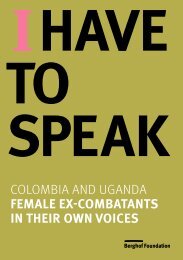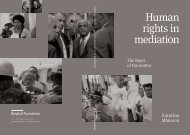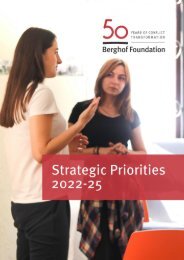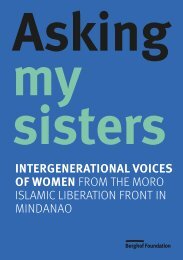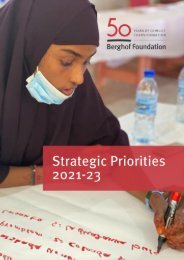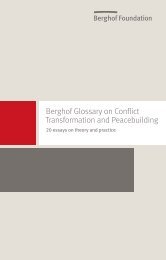Berghof Foundation: 50 years of conflict transformation
This book provides an overview of the Berghof Foundation’s work and impact over the past 50 years and sheds light on the challenges ahead of peacebuilding.
This book provides an overview of the Berghof Foundation’s work and impact over the past 50 years and sheds light on the challenges ahead of peacebuilding.
You also want an ePaper? Increase the reach of your titles
YUMPU automatically turns print PDFs into web optimized ePapers that Google loves.
The <strong>Bergh<strong>of</strong></strong> <strong>Foundation</strong> as a pioneer <strong>of</strong><br />
civil society and action-oriented <strong>conflict</strong><br />
and peace research<br />
1970s<br />
It is not war that is the real issue, but peace — this was<br />
the theme <strong>of</strong> Gustav Heinemann’s inaugural speech<br />
as Federal President in 1969, which marked the<br />
start <strong>of</strong> state-funded peace and <strong>conflict</strong> research in<br />
Germany. Just one year later, the German Society for<br />
Peace and Conflict Research was founded, followed<br />
by institutions that are still prominent today, such as<br />
the Peace Research Institute Frankfurt (Hessische<br />
Stiftung Friedens- und Konfliktforschung — HSFK)<br />
and the Institute for Peace Research and Security<br />
Policy at the University <strong>of</strong> Hamburg.<br />
The Cold War, security threats from<br />
conventional arms races and the dangers <strong>of</strong> war<br />
posed by the nuclear deterrent system were<br />
salient reasons for this development. Against this<br />
background, and with momentum created by the<br />
student movement in the 1960s and the change <strong>of</strong><br />
government to a social-liberal coalition in Germany,<br />
there was a willingness to formulate and shape a new<br />
peace policy at the end <strong>of</strong> the 1960s that was unique<br />
in Germany’s post-war history.<br />
It was in this spirit <strong>of</strong> optimism that Pr<strong>of</strong>essor<br />
Georg Zundel took the decision to establish the<br />
private <strong>Bergh<strong>of</strong></strong> <strong>Foundation</strong> for Conflict Research<br />
in 1971. It focused on several key aspects: (1)<br />
(interdisciplinary) cooperation between the<br />
social and natural sciences; (2) the analysis <strong>of</strong><br />
complex structural and direct relations <strong>of</strong> violence,<br />
including with countries <strong>of</strong> the Global South; (3) the<br />
exploration <strong>of</strong> civil, non-violent alternatives to the<br />
prevailing military-supported security policy and the<br />
individual and societal preconditions for successful<br />
peacebuilding; and (4) the communication and<br />
application <strong>of</strong> research results to support peace<br />
education and peace policy practice.<br />
In its first decade, the <strong>Bergh<strong>of</strong></strong> <strong>Foundation</strong><br />
funded not only larger projects but also several<br />
journals and more than 20 organisations located<br />
at the intersections <strong>of</strong> peace research, peace<br />
education and the peace movement. These were<br />
<strong>of</strong>ten smaller grants for projects that would otherwise<br />
have had little chance <strong>of</strong> receiving financial support<br />
under the emerging state and academic funding<br />
system. Funding was provided for working groups,<br />
conferences and international exchange, as well<br />
as for the development <strong>of</strong> a peace education<br />
infrastructure in Germany. The Institute for Peace<br />
Education founded in Tübingen in 1976 — formerly the<br />
Association for Peace Education — was among the<br />
organisations that received funding during the 1970s.<br />
Based on experience <strong>of</strong> the first decade, the<br />
<strong>Bergh<strong>of</strong></strong> <strong>Foundation</strong>’s Board decided in 1985 to define<br />
various strategic priorities and promote research<br />
projects and activities that focused on peacebuilding<br />
and peace education, social movements and nonviolent<br />
action, global political trends and <strong>conflict</strong><br />
dynamics in the Global South, and armament<br />
dynamics and their implications for peacebuilding<br />
policy and structures in Europe.<br />
In setting these priorities, the <strong>Bergh<strong>of</strong></strong><br />
<strong>Foundation</strong> enriched the research landscape and<br />
enabled civil society actors — through infrastructural<br />
aid and participatory action research — to support<br />
the peace movement in Germany, which had gained<br />
strength in the 1980s. The need for this was obvious.<br />
On the one hand, the general public had to be made<br />
aware <strong>of</strong> the peace-threatening dimensions <strong>of</strong> the<br />
prevailing security policy, and on the other hand,<br />
it was a matter <strong>of</strong> supporting an emerging societal<br />
learning process on issues <strong>of</strong> peace policy. The<br />
decision to station new (tactical) nuclear weapons in<br />
Germany in December 1979 raised many questions<br />
for which answers had to be found. At the same time,<br />
there was a growing interest in appropriate forms<br />
<strong>of</strong> action within the new peace movement. Many <strong>of</strong><br />
the research papers and learning materials whose<br />
development and publication were facilitated by the<br />
<strong>Bergh<strong>of</strong></strong> <strong>Foundation</strong> and which focus on non-violent<br />
resistance and non-violence as a principle <strong>of</strong> life and<br />
action have been agreed, discussed and enhanced<br />
at conferences and during courses and workshops.<br />
Frequently, the direct experiences <strong>of</strong> participants<br />
in non-violent action have been incorporated into<br />
this process.<br />
In the process <strong>of</strong> clarifying the relationship<br />
with the peace movement, a principle has emerged<br />
that is still valid for the <strong>Bergh<strong>of</strong></strong> <strong>Foundation</strong>’s<br />
approach today: making people aware <strong>of</strong> the<br />
correlation and simultaneous difference between<br />
attitudes and personal commitment, on the one<br />
hand, and pr<strong>of</strong>essional peacebuilding as enabling,<br />
counselling and supporting, on the other. Building on<br />
these experiences, institutions such as the Research<br />
Institute <strong>of</strong> the <strong>Bergh<strong>of</strong></strong> <strong>Foundation</strong> (1989), the<br />
<strong>Bergh<strong>of</strong></strong> Research Center for Constructive Conflict<br />
Management (1993, later <strong>Bergh<strong>of</strong></strong> Conflict Research),<br />
the Institute for Peace Education (1999) and <strong>Bergh<strong>of</strong></strong><br />
Peace Support (2004) were each able to set new<br />
accents in theory and practice and unite them in 2012<br />
within the framework <strong>of</strong> the <strong>Bergh<strong>of</strong></strong> <strong>Foundation</strong>,<br />
which — <strong>50</strong> <strong>years</strong> after its founding — continues to<br />
explore the academic bases for the promotion <strong>of</strong><br />
peacebuilding capacity and <strong>conflict</strong> <strong>transformation</strong>,<br />
both in Germany and around the world.<br />
34<br />
35




